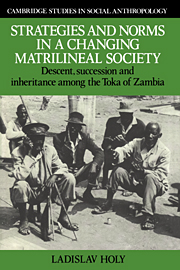 Strategies and Norms in a Changing Matrilineal Society
Strategies and Norms in a Changing Matrilineal Society Published online by Cambridge University Press: 25 August 2009
Change of residence upon marriage
Out of 134 women in Ngwezi, 117 (87.3%) changed their residence on marriage and moved to the villages of their husbands; 14 of them did so twice during their lives. The remaining 17 (12.7%) were either joined by their husbands in their own villages or married men from their own villages. The women in my Ngwezi sample accomplished altogether 220 changes of residence, of which 121 (55.0%) occurred upon their marriage.
Only 25 men out of 119 (21.0%) changed their residence upon marriage and left their own villages for those of their wives. As in Guta and Cifokoboyo, most of them had to reside uxorilocally because they had not completed the transfer of bridewealth. For many of them, uxorilocal residence was only a temporary arrangement and later they moved, with their wives, either to their own or to some other village. Because of the otherwise low inter-village mobility of men, uxorilocal residence is a more significant reason for a man's move from one village to another in Ngwezi than in Guta and Cifokoboyo. The Ngwezi men in my sample accomplished altogether 94 moves from one village to another, of which the 25 changes of residence upon marriage represent 26.6% (as against 10.5% in Cifokoboyo).
Change of residence upon the death of the spouse
Thirty-five women in my Ngwezi sample had experienced widowhood, six of them twice. Three had also experienced divorce.
To save this book to your Kindle, first ensure no-reply@cambridge.org is added to your Approved Personal Document E-mail List under your Personal Document Settings on the Manage Your Content and Devices page of your Amazon account. Then enter the ‘name’ part of your Kindle email address below. Find out more about saving to your Kindle.
Note you can select to save to either the @free.kindle.com or @kindle.com variations. ‘@free.kindle.com’ emails are free but can only be saved to your device when it is connected to wi-fi. ‘@kindle.com’ emails can be delivered even when you are not connected to wi-fi, but note that service fees apply.
Find out more about the Kindle Personal Document Service.
To save content items to your account, please confirm that you agree to abide by our usage policies. If this is the first time you use this feature, you will be asked to authorise Cambridge Core to connect with your account. Find out more about saving content to Dropbox.
To save content items to your account, please confirm that you agree to abide by our usage policies. If this is the first time you use this feature, you will be asked to authorise Cambridge Core to connect with your account. Find out more about saving content to Google Drive.